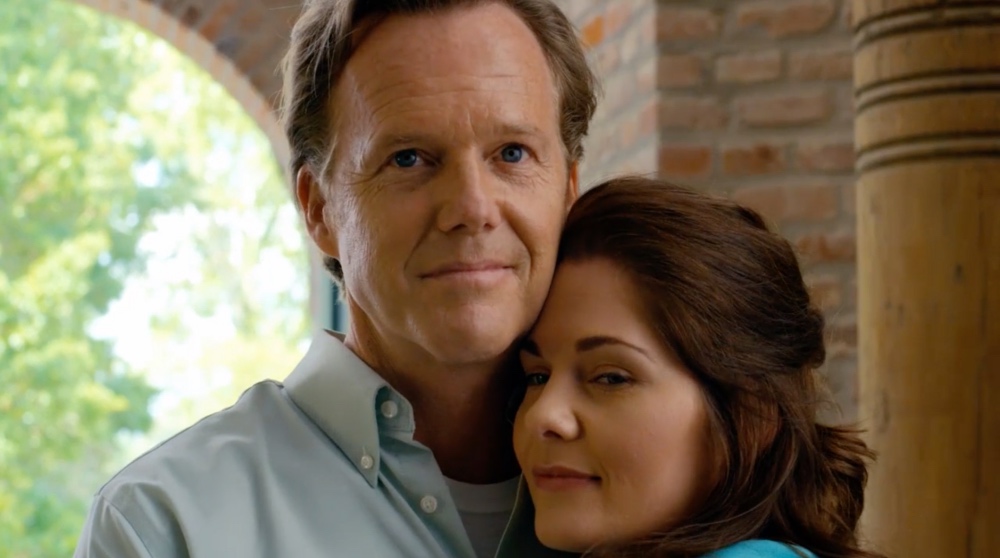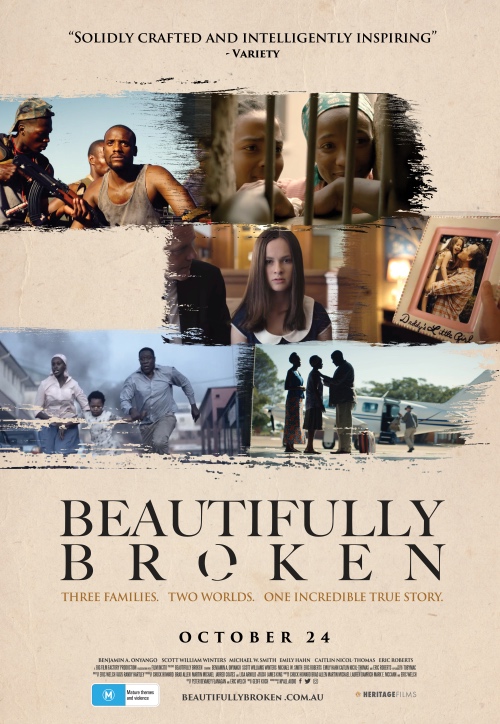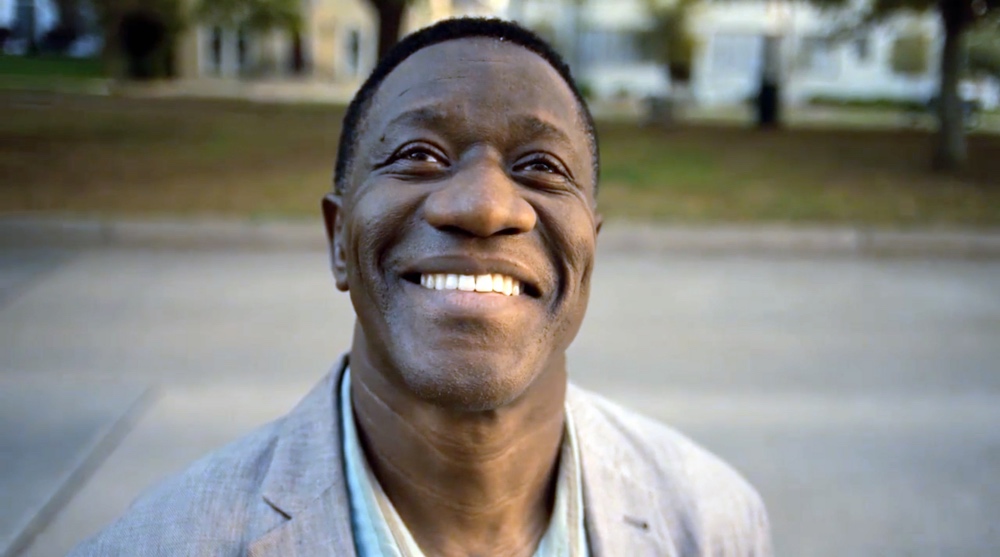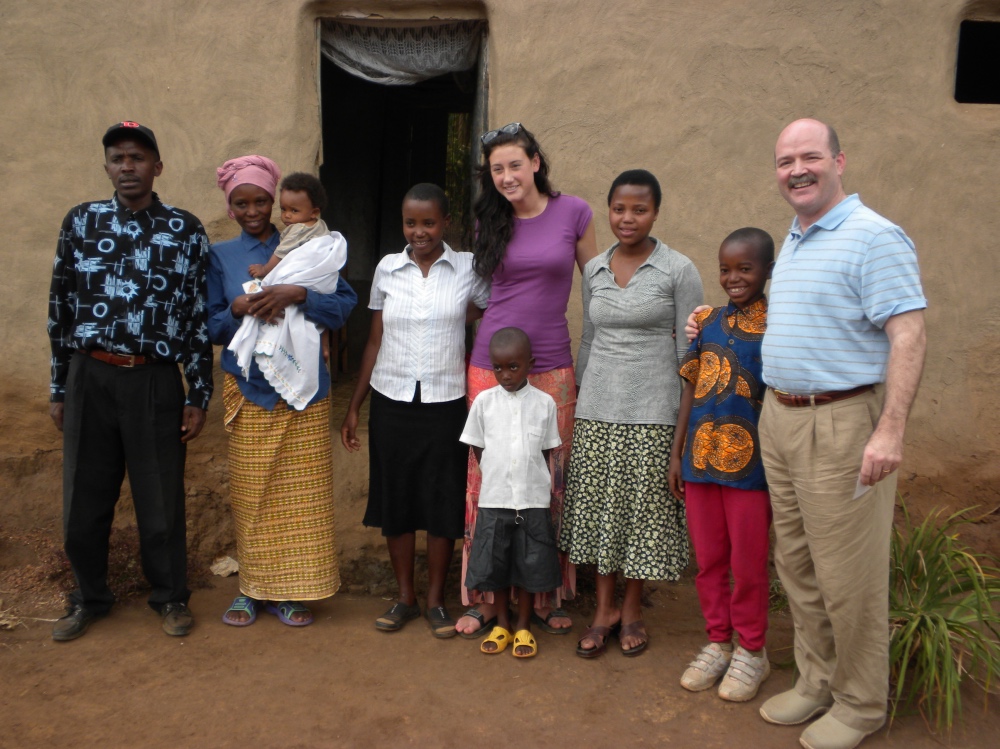
DAVID ADAMS speaks to American Randy Hartley about the extraordinary story of healing, forgiveness and reconciliation now captured on film in ‘Beautifully Broken’…
When American financial planner Randy Hartley first met Rwandan refugee William Mwizerwa in the US city of Nashville more than a decade ago it was the start of a connection which would deeply impact not just their own lives but those of their families as well as that of a third man, Mugenzi, the father of Hartley’s Rwandan sponsor child, Umuhoza.
“[E]very family had gone through brokenness, through a crisis, that they couldn’t control and every family was fighting hard to figure out how to get through it,” says Randy Hartley, speaking to Sight from Nashville last week.
Drawing on the analogy of stained glass – in which “shattered pieces” are put back together make a beautiful whole – he says their stories show the possibilities of restoration.
“I think in the end it just shows God can put those pieces back together…So yes, we’re all broken in some way but it can be ‘beautifully broken’.”

Scott William Winters plays Randy Hartley in Beautifully Broken, seen here with Caitlin Nicol-Thomas, who plays Hartley’s wife Darla. PICTURE: Supplied.
That idea – being “beautifully broken” – lies at the heart of the film of the same name which tells the story of the three families. It’s being released in Australian cinemas this week following its release in the US last year.
The film tells the story of Mwizerwa (played by Benjamin A Onyango), a manager at a coffee company in Rwanda when the 1994 genocide broke out and resulted in, over the next 100 days, more than 800,000 people killed in attacks targeting Tutsis and some moderate Hutus.

“I think in the end it just shows God can put those pieces back together…So yes, we’re all broken in some way but it can be ‘beautifully broken’.”
– Randy Hartley
Mwizerwa, himself a Tutsi, was able to escape with his wife and children, and eventually ended up in a refugee camp in Kenya before he was given the opportunity to go to the US under a special program for refugees and work, in via a long and arduous process, towards bringing his family to the country.
It was while there in the US, through the pastor at the church he attended (played in the film by prominent Christian music identity Michael W Smith), that met Hartley and started a home for refugees, Legacy Mission Village.
Hartley, played by Scott William Winters in the film, meanwhile, was having his own family troubles as, without explanation, his then-16-year-old daughter Andrea (played by Emily Hahn) inexplicably changed, and pulled away from he and his wife Darla (Caitlin Nicol-Thomas).
It was the opportunity to take his daughter into a new environment that in 2009 led Hartley to suggest they undertake a trip to Rwanda with the Mwizerwas to meet the child the Hartley family supported through child sponsorship agency Compassion, a girl named Umuhoza (played by Ditebogo Ledwaba). Her Hutu father Mugenzi (Bonko Khoza) had previously served time in prison for what was, according to the film, his reluctant role in the genocide.
The trip – which was the first the Mwizerwas had returned to Rwanda – would prove to be one that would change all their lives but to say more could end up venturing into spoiler territory.
Hartley says the story as it appears on screen is 75 to 80 per cent true to life with 15 per cent tweaked a little and just five per cent created to help the story flow.
“We had to kind of simplify it,” says Hartley, “It’s a complicated enough timeline as it is…But the real story itself, it’s all there.”

Benjamin A Onyango plays William Mwizerwa in the film. PICTURE: Supplied.
The decision to make the film, which was partly shot in South Africa and partly in Louisiana in the US, only came about as Hartley was telling others about the events that the film portrays and was encouraged to keep a blog detailing what had happened.
Then in May, 2013, he met the new husband of one of his clients who worked for Disney for 20 years before he became a pastor and now made documentaries.
“And I said, ‘I’ve got a story for you’ and two hours later after talking and crying and praying, he invited me to his production company a week later. It just so happened we were taking a mission trip [to Rwanda] with the Mwizerwas about six weeks after that and he joined us. He filmed a lot of that and we ended up making a documentary.”
Hartley says the success of that award-winning documentary – which is included as part of the DVD of the film released in the US – gave him “gumption” to then consider making a feature film.
Hartley spent a year working with scriptwriters and says that every time they would try to add something to the story, he would “red line it and scratch it all out and bring it back to truth”.
“Because I wanted the movie to be powerful but I didn’t want it to be discounted; I didn’t want anybody to be able to say ‘Well, that could never have happened’ because I’m here to tell you, I lived it and it happened. And I think that’s what makes the personal testimony of it such a powerful illustration of God’s will and God’s faithfulness.”
One of the big themes running through the film is that of refugees and Hartley says that before he met William, he didn’t really have a full grasp on what refugees went through. And while he adds that he didn’t particularly set out to make a film about refugees, he says for those who watch the movie, “William personally puts a face on who refugees are and I think it shines a nice light on [the issue]”.
“I’m not smart enough to know what the real answers are for everything.” he tells Sight. “But here’s what I do know: whatever the politics are, when a refugee is in our community, I think, as Christians, it’s incumbent on us to serve them and welcome them just like we would welcome any neighbour. And I know this from my personal experience: that working with the refugee families that I know…they are some of the most, inspiring, hard-working, admirable people of any I’ve ever met.”
He adds that the Christian refugees he knows “hold on to God’s promise of salvation” in a way he envies. “And I think there’s a lot we can learn from that.”
Hartley, who says he wanted to make the film so it was entertaining for a wide audience, says the faith-based element in the film “comes through very organically”.
“In fact…I’ve had some people I know who are atheists who have gone to the movie and said ‘Wow, that was fantastic’. Because they don’t feel like they’re being beat over the head with a Bible…I don’t think you’re going to convert people by making non-believers look idiotic or giving a false promise that if you confess your faith and say a prayer, God solves your problems immediately.”

Randy Hartley (right) and his daughter Andrea (in purple) with Umuhoza (white top) and family members in Rwanda in 2009. PICTURE: Supplied
Hartley says he has been humbled by the reception the film has received and the impact it’s had on people to date.
“I’ve had people [come up me]…and say ‘I need go and call somebody and forgive them’. I’ve had refugees come up to me and say ‘Thankyou for showing a true and accurate portrayal and treating us with dignity’. So there’s many different takeaways because it is real…[I]t’s got a little bit more grit and dirtiness and uncomfortableness and inconvenience than some faith-based films because I wanted it to be real and I wanted them to be able to see themselves in the movie and, based on feedback, I think we’ve succeeded.”
While Hartley says he and Darla had been brought up in Christian homes and always attended church together, until the events described in the film, his faith “was never truly tested”.
“And it’s like so many things – when you go through the test, the heat makes it stronger,” he says, noting that the film’s story could also resonate with people who may have lost their faith after a traumatic experience such as those recounted in the film, including by his own daughter.
Hartley is now working on a book telling the story with New York Times best-selling author Ken Abraham which they hope to have out at Easter. It will be an expanded version of what’s seen on screen.
“The scriptwriters said ‘Normally we have 45 minutes of story we stretch to 90 minutes. Here we have a mini-series we’re trying to cut down to one movie’,” he recalls. “So there’s much more to it…and, in fact, where the movie ends is really where so many of the stories begin…”
They include how his daughter Andrea came to be working in Nairobi, Kenya, the stories of more of the refugees Hartley has encountered and that of the Hartley family’s former sponsor child Umuhoza, who went on to become the first in her family to graduate from college.
“So there’s more to it [and], good Lord willing, we’ll be able to get that message out as well,” says Hartley.
Beautifully Broken is released in Australia on 24th October.





